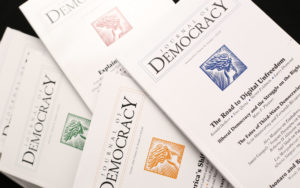 A vibrant protest movement is visible in Iran and across the Middle East — but it isn’t calling for Islamic revolution, much less the tired misrule of the mullahs, The Washington Post’s David Ignatius writes. It’s a bottom-up rebellion against the corrupt elites who rule Iran, Iraq, Lebanon and other countries. The Iraqi version of this movement is sometimes called “madaniyya,” which Iraq expert Nibras Kazimi translates as a call for civic rebirth. The autocrats have tried everywhere to crush or manipulate this movement, but it persists, he adds.
A vibrant protest movement is visible in Iran and across the Middle East — but it isn’t calling for Islamic revolution, much less the tired misrule of the mullahs, The Washington Post’s David Ignatius writes. It’s a bottom-up rebellion against the corrupt elites who rule Iran, Iraq, Lebanon and other countries. The Iraqi version of this movement is sometimes called “madaniyya,” which Iraq expert Nibras Kazimi translates as a call for civic rebirth. The autocrats have tried everywhere to crush or manipulate this movement, but it persists, he adds.
In an attempt to put the spring back into the Arab Spring, the new uprisings insist on democratic reforms free of sectarianism, fundamentalism and authoritarianism, rejecting the pointless shift from one form of authoritarianism to another, analyst Marwan Bishara adds.
 As the tenth anniversary of the first uprising of the Arab Spring approaches, massive and sustained popular uprisings in Sudan, Algeria, Iraq, and Lebanon have shown that the Arab world is far from finished with the question of democracy, according to a leading analyst. In each of these countries, protesters have connected grievances about economic hardships and corruption to issues of governance. They have demanded changes to undemocratic aspects of current power structures: sectarian bargains in Iraq and Lebanon, and military dominance in Sudan and Algeria, notes Carnegie’s Michele Dunne.
As the tenth anniversary of the first uprising of the Arab Spring approaches, massive and sustained popular uprisings in Sudan, Algeria, Iraq, and Lebanon have shown that the Arab world is far from finished with the question of democracy, according to a leading analyst. In each of these countries, protesters have connected grievances about economic hardships and corruption to issues of governance. They have demanded changes to undemocratic aspects of current power structures: sectarian bargains in Iraq and Lebanon, and military dominance in Sudan and Algeria, notes Carnegie’s Michele Dunne.
Protesters in Sudan and Algeria also seem to have learned, perhaps primarily from their own countries’ experiences, that only by overcoming fears of violence can they begin addressing the problems of authoritarian rule, she writes for The Journal of Democracy:
The specific grievances of protesters—economic hardships and injustice, high-level corruption, poor government services—cannot be addressed without deep alterations in the power structure and political economy of Arab states. Given this, it is not reasonable to expect that change will come quickly, easily, or evenly across the region. Nor can one take for granted that all change will be in the direction of democracy.
 The conundrum for those calling for and seeking “freedom” in the Middle East is that, as layers of “nonfreedom” are peeled back, new layers of nonfreedom appear, argues analyst Sam Sweeney. A legitimate political system that can guarantee freedom remains elusive in the Middle East. Identifying such a system, and figuring out how to implement it, should be the primary task of serious thinkers in the region, he writes for The National Review.
The conundrum for those calling for and seeking “freedom” in the Middle East is that, as layers of “nonfreedom” are peeled back, new layers of nonfreedom appear, argues analyst Sam Sweeney. A legitimate political system that can guarantee freedom remains elusive in the Middle East. Identifying such a system, and figuring out how to implement it, should be the primary task of serious thinkers in the region, he writes for The National Review.
One of the remarkable developments of 2019 was a fresh wave of anti-government and anti-graft protests in Sudan, Algeria, Egypt, Iraq, and Lebanon, one that revived the hopes of the 2010-2011 Arab Spring that had been dormant because of counterrevolutions, notes the Arab Center Washington DC (ACW) in a discussion of “Prospects for Democratic Change in the Arab World in 2020.”
 To be sure, the slogans shouted by demonstrators in the five countries highlight a clear demand for political and socioeconomic changes that are no different from those heard in the first wave, the analysts suggest. However, there appear to be some important differences in the way demonstrators are voicing these slogans and how they are going about making them actionable, effective, sustainable, and eventually, successful.
To be sure, the slogans shouted by demonstrators in the five countries highlight a clear demand for political and socioeconomic changes that are no different from those heard in the first wave, the analysts suggest. However, there appear to be some important differences in the way demonstrators are voicing these slogans and how they are going about making them actionable, effective, sustainable, and eventually, successful.
The region’s Islamists and secularists need a pact that allows them to compete and survive when the other side is in power, according to Jamal Khashoggi fellow It is a difficult but not impossible task: World history is rife with examples of societies that have traveled down this road. The warring factions in Germany’s Thirty Years’ War, for instance, killed a fifth of its population and destroyed its economy without achieving a meaningful victory, and ultimately had to settle for coexistence, he writes for The Washington Post.
Governance in Arab states a decade from now will probably involve a patchwork of systems, adds Dunne, a board member of the National Endowment for Democracy. Nascent forms of democracy have the best chance of taking root in those countries where levels of human development are relatively high, states are less able to rely on hydrocarbon rents, and intervention by regional or outside frenemies is less prevalent. RTWT







